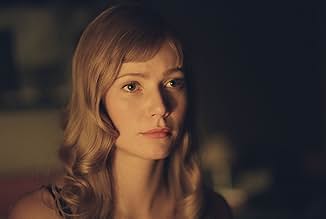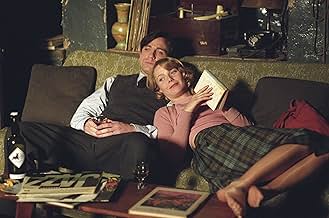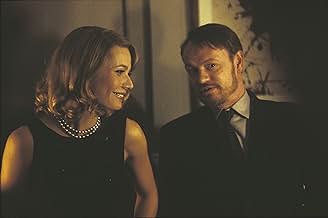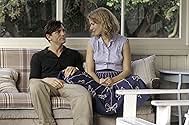IMDb रेटिंग
6.3/10
11 हज़ार
आपकी रेटिंग
अपनी भाषा में प्लॉट जोड़ेंStory of the relationship between poets Edward James "Ted" Hughes and Sylvia Plath.Story of the relationship between poets Edward James "Ted" Hughes and Sylvia Plath.Story of the relationship between poets Edward James "Ted" Hughes and Sylvia Plath.
- पुरस्कार
- कुल 1 जीत
फ़ीचर्ड समीक्षाएं
After viewing the film on Sylvia Plath, I felt a need to read about this poet and find out exactly what Hollywood did with it. As usual, Hollywood transformed a person's life into what an audience would want to be amused by. Mr. Hughes is personified as a womanizer and adulterer, the later of which may be true. After reading two biographies of Ms. Plath by Linda W. Wagner-Martin and Anne Stevenson and of course having studied Ms. Plath's poetry, I feel that the film, albeit entertaining does not depict her actual identity. It does a marginal account of her life, or part of her life. As any human being, Ms. Plath suffered from many demons. If you ascribe to an astrological standpoint (as Mr. and Mrs. Hughes did) you will find that Sylvia was doomed by her astrological sign, Scorpio. Those of you who are Scorpios know that there is a dark side to this sign. She set her expectations too high of most things and considered the failure of loyalty from her friends and family detrimental. Her experiences with depression only added fuel to the flame. Had she lived in modern times, maybe the newer therapies could have helped her. Depression is a severe affliction and may make a great poet, but for everyday living it can render a person helpless. It can make one helpless with dealing with marriage and children, life in general, and one's occupation. Sylvia Plath was a victim of her depression, her personality overreacting to life and her relationships. Unfortunately, she could not work her way through her inner problems and suffered the result of her mental blockage. Fortunately, for her children, they were unharmed by her mental illness and subsequent actions, and were eventually raised by their father. No one is to blame... no one is superhuman. If standards are set too high for anyone, as Sylvia set for herself, anyone is doomed to failure. We do have her poetry and novel(s) to see her inner self, which no film can properly depict.
When I rented this movie, I thought it would be about Sylvia's entire life, or at least starting from her days at Smith College. I didn't realize that her marriage with Ted Hughes would be the entire storyline. I think this movie would've been better had they shown more about Plath's life BEFORE Ted Hughes. For people who don't really know much about Plath and her poetry, understanding her life before Hughes would've made the film much more substantial. The audience has to realize that Plath led a very, very hard mental life even before she met Hughes, and her ideas for her poetry and 'The Bell Jar' mostly originated from her bachelorette days. She never recovered from her depression as a young woman and it branched out still as she married Hughes. Without understanding Plath from the beginning hinders the audience from understanding Plath at all.
I feel like the movie only told half the story. Plath's mind was beautiful, colorful, and brilliant. It wasn't just about the jealousy, depression, and paranoia. Putting her works on the back burner really took away most of this movie. I would've liked to see more narration by Plath and giving us an insight into her mind, the way her unabridged journals do. However, I really enjoyed the dialogue of this movie; the lines were poetic and beautiful.
Unfortunately, I am still waiting for a better Sylvia Plath movie. I recommend people to read 'The Bell Jar' and 'Ariel' before or after seeing this movie though.
I feel like the movie only told half the story. Plath's mind was beautiful, colorful, and brilliant. It wasn't just about the jealousy, depression, and paranoia. Putting her works on the back burner really took away most of this movie. I would've liked to see more narration by Plath and giving us an insight into her mind, the way her unabridged journals do. However, I really enjoyed the dialogue of this movie; the lines were poetic and beautiful.
Unfortunately, I am still waiting for a better Sylvia Plath movie. I recommend people to read 'The Bell Jar' and 'Ariel' before or after seeing this movie though.
It's 1956 Cambridge, England. American student Sylvia Plath (Gwyneth Paltrow) is dismissed by the high-minded poetry review. She is taken with fellow student Edward Ted Hughes (Daniel Craig)'s poems. They eventually get married. He has many female fans and she suspects his infidelity. They have two children. She struggles to write under successful Ted's overwhelming shadow. She falls into depression and eventually commits suicide in 1963.
It's a downbeat biopic that bothers on old-fashion melodrama. Paltrow is lovely but I figured Plath would be more fragile even before her breakdown. Daniel Craig has the prerequisite charisma. The movie is very flat. It is unable to elevate the material into something more dramatic. This is a long drawn out character study that isn't terribly interesting.
It's a downbeat biopic that bothers on old-fashion melodrama. Paltrow is lovely but I figured Plath would be more fragile even before her breakdown. Daniel Craig has the prerequisite charisma. The movie is very flat. It is unable to elevate the material into something more dramatic. This is a long drawn out character study that isn't terribly interesting.
"Sylvia" is not quite just a slow, straightforward bio-pic of poet Sylvia Plath. While screenwriter John Brownlow has a long background in TV documentaries, director Christine Jeffs has previously made a young woman's mental disquiet dreamily visual in the superb New Zealand film "Rain."
She has her "Rain" cinematographer John Toon bathe the entire film in a nostalgia-tinged amber glow, like the extended flashbacks to the young lovers in the Australian film "Innocence." I think the point is to determinedly place Plath and her husband poet Ted Hughes into their specific time at the cusp before "The Feminine Mystique" put a name to Plath's frustrations and contradictions as a Fulbright scholar - experimental poet turned wife and mother who ultimately turned on herself. ("Mona Lisa's Smile" with Julia Roberts will evidently be dealing with a parallel time and place in a much more Hollywood interpretation.)
As played alternatively languid and aggressive by Gwyneth Paltrow and a Byronic Daniel Craig, they are an actively sensual couple, but notably not Bohemian. They are part of an intellectual but not counter-cultural set. While they are competing for editors' accolades and print space, she's setting her hair, arranging her pearls and cleaning house, like a proper Smith graduate of the time who is perfectly at home visiting her Boston mother (played by real-life mom Blythe Danner) and amidst the books of her late bee scholar father (My friend the PhD in English tells me that the original film title of "The Bee-Keeper's Daughter" would have been fraught with much more significance about Plath's obsessions.)
Hughes celebrates his first big break by asking her to marry him and kids follow one after the other; when they need money he looks to write a children's series for the BBC. Yes, she gets more and more difficult and paranoid, but he is having affairs (and another child) as he attracts more fawning women acolytes.
An earlier suicide effort is referenced a couple of times yet her increasingly heightened mental imbalance as shown here could be post-partum depressions or a Laingian response that insanity is the only rational response to an insane, unfair world. (The film does not seem to side with her loyalist cult which Margaret Atwood satirizes in "The Blind Assassin").
It is always difficult to show a writer at work, but I would have liked to hear more of her poetry than a few passing sentences.
Gabriel Yared's music is lovely and unsentimental.
She has her "Rain" cinematographer John Toon bathe the entire film in a nostalgia-tinged amber glow, like the extended flashbacks to the young lovers in the Australian film "Innocence." I think the point is to determinedly place Plath and her husband poet Ted Hughes into their specific time at the cusp before "The Feminine Mystique" put a name to Plath's frustrations and contradictions as a Fulbright scholar - experimental poet turned wife and mother who ultimately turned on herself. ("Mona Lisa's Smile" with Julia Roberts will evidently be dealing with a parallel time and place in a much more Hollywood interpretation.)
As played alternatively languid and aggressive by Gwyneth Paltrow and a Byronic Daniel Craig, they are an actively sensual couple, but notably not Bohemian. They are part of an intellectual but not counter-cultural set. While they are competing for editors' accolades and print space, she's setting her hair, arranging her pearls and cleaning house, like a proper Smith graduate of the time who is perfectly at home visiting her Boston mother (played by real-life mom Blythe Danner) and amidst the books of her late bee scholar father (My friend the PhD in English tells me that the original film title of "The Bee-Keeper's Daughter" would have been fraught with much more significance about Plath's obsessions.)
Hughes celebrates his first big break by asking her to marry him and kids follow one after the other; when they need money he looks to write a children's series for the BBC. Yes, she gets more and more difficult and paranoid, but he is having affairs (and another child) as he attracts more fawning women acolytes.
An earlier suicide effort is referenced a couple of times yet her increasingly heightened mental imbalance as shown here could be post-partum depressions or a Laingian response that insanity is the only rational response to an insane, unfair world. (The film does not seem to side with her loyalist cult which Margaret Atwood satirizes in "The Blind Assassin").
It is always difficult to show a writer at work, but I would have liked to hear more of her poetry than a few passing sentences.
Gabriel Yared's music is lovely and unsentimental.
There is a certain type of undergraduate who sees Sylvia Plath as the victim-heroine of a period that lionized talented men but had no place for women of similar gifts, and fortunately this film does not pander to them. Poets rarely receive lavish acclaim or wealth during their lifetimes, and hers was at least equal to her talent and irrespective of her gender. Any reasonably critical reader of her autobiographical novel The Bell Jar can see evidence of serious mental illness, which in Plath's case went largely untreated, and this film chooses to focus more on that aspect of her life than on anti-feminist conspiracy theories. However, the film comes up short of fully showing Plath as the highly complex and contradictory person her contemporaries knew: sexy, seductive yet so harsh and venal in her judgments of men (especially her husband and her father) as to seem man-hating; also manipulative and vain and yet so insecure that she went long periods without writing. She was likely bi-polar and could on occasion be described as downright monstrous, yet the film hollywoodizes Plath into a more conventional 'troubled' melodrama heroine, rather than delving deeper into the brutal reality of the day-to-day life of someone with significant mental illness. This is surprising given that director Christine Jeffs' earlier film on mental illness, Rain, was unstintingly honest. Plath's well known life history is covered in straightforward biopic narrative: her close-distant, love-hate yo-yo relationship with her mother; her famous first suicide attempt and the subsequent year spent in a sanatorium that was the basis for The Bell Jar; her rocky marriage to British poet Ted Hughes that ended because of his infidelity; her prolific period as a celebrated poet and her eventual death by suicide while still young.
I should point out that I thought the cinematography and production design were wonderful. The excellent period look is established by bleeding out bright color from every scene while giving it an amber tint like old photographs. The sets were almost hyper-realistic - cluttered, dim and claustrophobic with none of the romanticized shininess that Hollywood often lavishes on period dramas.
I should point out that I thought the cinematography and production design were wonderful. The excellent period look is established by bleeding out bright color from every scene while giving it an amber tint like old photographs. The sets were almost hyper-realistic - cluttered, dim and claustrophobic with none of the romanticized shininess that Hollywood often lavishes on period dramas.
क्या आपको पता है
- ट्रिवियाFrieda Hughes, Sylvia Plath's daughter and literary executor, didn't allow the producers to access to her mother's poetry. She also publicly denounced the project in a published poem of her own.
- गूफ़When Ted and Sylvia are in bed together and she is discussing her suicide attempt, you can clearly see Daniel Craig's tattoo through the make up on his shoulder and Gwyneth Paltrow's hair net to which her wig is attached.
- भाव
Sylvia: [to Ted, after making love] We're not even two people. Even before we met, we were just these two halves, walking around with big gaping holes in the shape like the other person. And when we found each other we were finally whole. And then it was as if we couldn't stand being happy so we ripped ourselves in half again.
टॉप पसंद
रेटिंग देने के लिए साइन-इन करें और वैयक्तिकृत सुझावों के लिए वॉचलिस्ट करें
- How long is Sylvia?Alexa द्वारा संचालित
विवरण
बॉक्स ऑफ़िस
- बजट
- £70,00,000(अनुमानित)
- US और कनाडा में सकल
- $13,15,498
- US और कनाडा में पहले सप्ताह में कुल कमाई
- $58,940
- 19 अक्टू॰ 2003
- दुनिया भर में सकल
- $29,17,393
- चलने की अवधि1 घंटा 50 मिनट
- रंग
- ध्वनि मिश्रण
- पक्ष अनुपात
- 2.35 : 1
इस पेज में योगदान दें
किसी बदलाव का सुझाव दें या अनुपलब्ध कॉन्टेंट जोड़ें




































